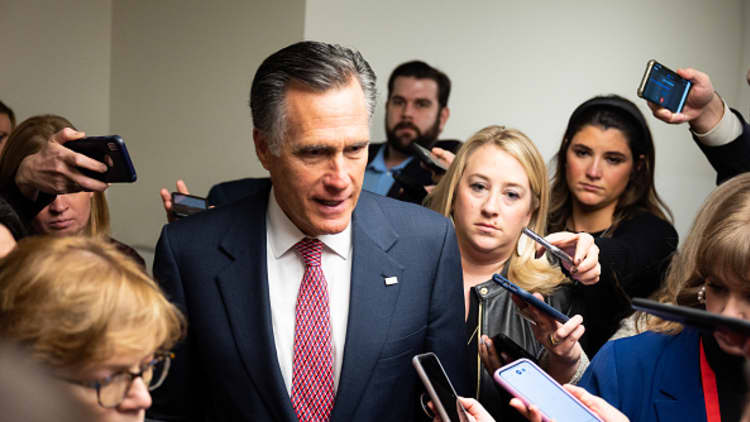
Senators are set to vote Friday on whether to include new witnesses and documents in President Donald Trump's impeachment trial, a pivotal moment in the proceedings that could pave the way for Trump's acquittal.
Democrats, led by Senate Minority Leader Chuck Schumer of New York and House impeachment manager Rep. Adam Schiff of California have fought tooth and nail to convince the Republican-led chamber to vote to hear from key witnesses who did not testify in the House.
But after more than a week of trading barbs with Trump's defense team on the Senate floor, it appears unlikely that the Democrats will secure the 51 votes required to pass a rule that would introduce new witnesses and documents.
If the rule were to pass, Democrats would almost certainly seek to compel testimony from acting White House chief of staff Mick Mulvaney, and from John Bolton, Trump's former national security advisor.
Bolton reportedly wrote in his forthcoming memoir that Trump told him last summer that he intended to withhold nearly $400 million in U.S. foreign aid to Ukraine until Kyiv agreed to announce investigations into the president's political opponents. The House voted to impeach Trump in December on two articles, abuse of power and obstruction of Congress, both stemming from Trump's handling of the U.S. relationship with Ukraine.
Democrats see both of these witnesses as crucial to successfully proving the two main allegations contained in the impeachment articles. Without them, Democrats see little chance of ever overcoming the wave of Republican opposition to convicting Trump and removing him from office. Trump has denied any wrongdoing.
A victory in Friday's vote appeared to slip further away from Democrats late Thursday night, after a key Republican senator announced that he would oppose any attempts to introduce new evidence at the trial.
In a statement, GOP Sen. Lamar Alexander of Tennessee said that although he believed the president had indeed solicited foreign assistance from Ukraine in his reelection bid, Trump's behavior did not meet the standard for impeachment. As such, Alexander said he didn't see the need for further evidence.
Another Republican, Sen. Susan Collins of Maine said Thursday that she planned to break with her party and vote for additional witnesses. On Friday morning, an aide to Sen. Mitt Romney, R-Utah, also confirmed that he would vote with the Democrats.
Republicans hold a 53-47 majority in the Senate, meaning at least four GOP senators will have to break with their party and vote for a resolution to admit additional witnesses and documents into the trial.
Collins and Romney had already been factored into Democrats' planning for the vote, however, and they remained two Republican votes short of a majority as of late Friday morning.
This next phase of Trump's impeachment trial gets underway Friday at 1 p.m. ET, with up to four hours of equally divided time allotted for senators to debate, before votes are called on amendments, including whether or not to subpoena witnesses and additional documents. Senators in each party are not required to use up their entire two hours, so the timing of Friday's votes will remain fluid throughout the afternoon.
If the proposal to admit new witnesses doesn't pass, which looks increasingly likely, then Senate Majority Leader Mitch McConnell could decide to proceed to a final vote on whether to convict or acquit the president as early as Friday evening. The trial schedule is complicated by two major events early next week: The 2020 Iowa caucuses on Monday, and the president's State of the Union address on Tuesday night.
McConnell has made no secret of his desire to conclude the Senate trial as soon as he can. But the Iowa caucuses and the State of the Union mean that if a Friday vote on acquittal isn't feasible, the vote would need to be delayed until Wednesday. For the president, this would mean that he had to deliver his State of the Union address under a cloud of impeachment, and not under the glow of acquittal, as he would if the Senate voted before his speech.
As McConnell arrived at the Capitol on Friday morning, he declined to specify how he thought the day would progress. "I think we can all agree this is a big day," McConnell said.

